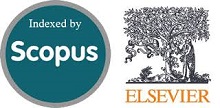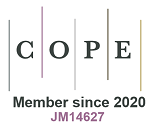Servant Leadership Styles: A Theoretical Approach
Abstract
Full Text: PDF
Keywords
References
Gandolfi, Franco, and Seth Stone. "Clarifying leadership: High-impact leaders in a time of leadership crisis." Revista de Management Comparat International 17, no. 3 (2016): 212-224.
Gandolf F., "Fundamentals of leadership development, Executive Master’s in Leadership Presentation," in Executive Master’s in Leadership Presentation, Georgetown University, (2016).
Russell, Robert F., and A. Gregory Stone. “A Review of Servant Leadership Attributes: Developing a Practical Model.” Leadership & Organization Development Journal 23, no. 3 (May 2002): 145–157. doi:10.1108/01437730210424.
Sendjaya, Sen, and James C. Sarros. “Servant Leadership: Its Origin, Development, and Application in Organizations.” Journal of Leadership & Organizational Studies 9, no. 2 (September 2002): 57–64. doi:10.1177/107179190200900205.
Wong, Paul TP, and Don Page. "Servant leadership: An opponent-process model and the revised servant leadership profile." In Proceedings of the Servant Leadership Research Roundtable, Virginia Beach, VA, (2003):1-11.
Mcfarlane, Donovan A. "Impressed and Inspired: Encountering Genuine Leadership with Dr. Barry Posner and Dr. Agueda Ogazon." E Journal of Organizational Learning & Leadership 9, no. 2 (2011): 26–48.
Kiechel W., "The leader as servant," in Reflections on servant leadership: Service, stewardship, spirit, and servant-leadership, New York, NY, John Wiley and Sons, (1995):121-125.
DePree, M., Leadership Jazz, New York: Dell Publishing, (1992).
Gandolfi, Franco, Seth Stone, and Frank Deno. "Servant Leadership: An Ancient Style with 21 st Century Relevance." Review of International Comparative Management/Revista de Management Comparat International 18, no. 4 (2017).
Serrano M., "Servant leadership: A viable model for the Panamanian context?," Digital Dissertations International, vol. 67, no. 7, p. 173A. (AAT3228983), (2006).
Hoch, Julia E., William H. Bommer, James H. Dulebohn, and Dongyuan Wu. “Do Ethical, Authentic, and Servant Leadership Explain Variance Above and Beyond Transformational Leadership? A Meta-Analysis.” Journal of Management 44, no. 2 (August 31, 2016): 501–529. doi:10.1177/0149206316665461.
H. C. Minh, Complete works, Ha Noi: National Political Publishing House, Vol. 15. (2011): 670.
H. C. Minh, Complete works, Ha Noi: National Political Publishing House, Vol. 4. (2011): 65.
H. C. Minh, Complete works, Ha Noi: National Political Publishing House, Vol. 4. (2011): 52.
R. K. Greenleaf, “Servant Leadership: A Journey into the Nature of Legitimate Power and Greatness.” Business Horizons 22, no. 3 (June 1979): 91–92. doi:10.1016/0007-6813(79)90092-2.
MacKinnon, Joyce L. “Teacher as Servant: A Parable. Greenleaf RK. Newton Center, MA, The Robert K Greenleaf Center, 1987, Paper, 220 Pp, $7.” Journal of Physical Therapy Education 3, no. 1 (January 1989): 46. doi:10.1097/00001416-198901000-00011.
Goodlad, J., Mantle-Bromley, C., & Goodlad, S, “Education for Everyone: Agenda for Education in a Democracy.” Choice Reviews Online 42, no. 03 (November 1, 2004): 42–1699–42–1699. doi:10.5860/choice.42-1699.
McIntosh, Timothy Alan, Justin A. Irving, and Bethel Seminary. "Evaluating the Instrumento de Contribucion al Liderazgo de Siervo (ICLS) for reliability in Latin America." Servant Leadership Roundtable at Regent University, Virginia Beach (2008).
Koch C., "Servant leadership," America, vol. 191, no. 1, (2004):17-19.
Manning B., "Firefighting servant leadership: The right medicine," Fire Engineering, vol. 157(5), no. 6, (2004).
Crippen C., "Inclusive education: A servant-leadership perspective," in Education Canada, Vols. 19(4), 1045, (2005a).
Omoh D. A. O., Analysis of servant leadership characteristics: A case study of a community college president, Vols. 68(4-A), 1550, (UMI No. AAI3262849), 2007.
Irving, Justin A., and Gail J. Longbotham. "Servant leadership predictors of team effectiveness: Findings and implications." Proceedings of the American Society of Business and Behavioral Sciences 13, no. 1 (2006): 862-873.
Irving, Justin A., and Gail J. Longbotham. "Team effectiveness and six essential servant leadership themes: A regression model based on items in the organizational leadership assessment." International Journal of Leadership Studies 2, no. 2 (2007): 98-113.
Dingman W. A., "Servant leadership’s role in the succession planning process: A case study," (2007).
Stephen M. J., "Servant leadership: An examination of public school principals’ perceptions of servant leadership as a successful leadership style," Dissertation Abstracts International, Vols. 68(3-A), 831, no. (UMI No. AAI3259618), 2007.
Hart C., Doing a Literature Review, London: Sage, 1998.
Gregory Stone, A., Robert F. Russell, and Kathleen Patterson. “Transformational Versus Servant Leadership: a Difference in Leader Focus.” Leadership & Organization Development Journal 25, no. 4 (June 2004): 349–361. doi:10.1108/01437730410538671.
Sojka, Vladimír, and Petr Lepšík. “Use of TRIZ, and TRIZ with Other Tools for Process Improvement: A Literature Review.” Emerging Science Journal 4, no. 5 (October 1, 2020): 319–335. doi:10.28991/esj-2020-01234.
Greenleaf R. K., “The servant as leader,” Servant Leadership", 1970, p. 1–338.
Spears L., Insights on leadership: Service, stewardship, spirit and servant-leadership, New York, NY: John Wiley & Sons, (1998).
Van Dierendonck, Dirk, Daan Stam, Pieter Boersma, Ninotchka de Windt, and Jorrit Alkema. “Same Difference? Exploring the Differential Mechanisms Linking Servant Leadership and Transformational Leadership to Follower Outcomes.” The Leadership Quarterly 25, no. 3 (June 2014): 544–562. doi:10.1016/j.leaqua.2013.11.014.
Chen, Zhijun, Jing Zhu, and Mingjian Zhou. “How Does a Servant Leader Fuel the Service Fire? A Multilevel Model of Servant Leadership, Individual Self Identity, Group Competition Climate, and Customer Service Performance.” Journal of Applied Psychology 100, no. 2 (2015): 511–521. doi:10.1037/a0038036.
Chiniara, Myriam, and Kathleen Bentein. “Linking Servant Leadership to Individual Performance: Differentiating the Mediating Role of Autonomy, Competence and Relatedness Need Satisfaction.” The Leadership Quarterly 27, no. 1 (February 2016): 124–141. doi:10.1016/j.leaqua.2015.08.004.
Hu, Jia, and Robert C. Liden. “Antecedents of Team Potency and Team Effectiveness: An Examination of Goal and Process Clarity and Servant Leadership.” Journal of Applied Psychology 96, no. 4 (2011): 851–862. doi:10.1037/a0022465.
Schaubroeck, John, Simon S. K. Lam, and Ann Chunyan Peng. “Cognition-Based and Affect-Based Trust as Mediators of Leader Behavior Influences on Team Performance.” Journal of Applied Psychology 96, no. 4 (2011): 863–871. doi:10.1037/a0022625.
Peterson, Suzanne J., Benjamin M. Galvin, and Donald Lange. “CEO Servant Leadership: Exploring Executive Characteristics and Firm Performance.” Personnel Psychology 65, no. 3 (August 2, 2012): 565–596. doi:10.1111/j.1744-6570.2012.01253.x.
Sendjaya, Sen, James C. Sarros, and Joseph C. Santora. “Defining and Measuring Servant Leadership Behaviour in Organizations.” Journal of Management Studies 45, no. 2 (March 11, 2008): 402–424. doi:10.1111/j.1467-6486.2007.00761.x.
Liden, Robert C., Sandy J. Wayne, Hao Zhao, and David Henderson. “Servant Leadership: Development of a Multidimensional Measure and Multi-Level Assessment.” The Leadership Quarterly 19, no. 2 (April 2008): 161–177. doi:10.1016/j.leaqua.2008.01.006.
Van Dierendonck, Dirk, and Inge Nuijten. “The Servant Leadership Survey: Development and Validation of a Multidimensional Measure.” Journal of Business and Psychology 26, no. 3 (September 3, 2010): 249–267. doi:10.1007/s10869-010-9194-1.
Wang, C. X., Q. Ling, and X. J. Zhang. "The servant leadership scale design and inspection in chinese enterprise." Nankai Business Review 3 (2009): 94-103.
Eva, Nathan, Mulyadi Robin, Sen Sendjaya, Dirk van Dierendonck, and Robert C. Liden. “Servant Leadership: A Systematic Review and Call for Future Research.” The Leadership Quarterly 30, no. 1 (February 2019): 111–132. doi:10.1016/j.leaqua.2018.07.004.
The World Bank, "World Bank in Vietnam," 8 10 (2020). Available online: https://www.worldbank.org/vi/country/vietnam/overview. (accessed 30 November 2020).
Minh P. Q., "Vietnam 30 years of reform: Achievements, lessons and prospects," in International Workshop, Hanoi, For internal circulation only, (2016):11-16.
Nam, P. X., "Overview of Vietnamese society in the process of reform for development and international integration," 2010. Available online: http://www.hids.hochiminhcity.gov.vn/c/document_library/get_file?uuid=3ddff82d-d4b4-4ab4-ad2b-54b70d5469ee&groupId=13025. (accessed 30 November 30).
Phong, N. H., "Challenges in building public culture in our country today," (2019). Available online: http://lyluanchinhtri.vn/home/index.php/thuc-tien/item/2854-thach-thuc-trong-xay-dung-van-hoa-cong-vu-o-nuoc-ta-hien-nay.html. (accessed 30 November 2020).
VOV, "The full text of Central Resolution 4, Session XII on strengthening the party's regulation," 31 10 2016. Available Online: https://vov.vn/chinh-tri/dang/toan-van-nghi-quyet-trung-uong-4-khoa-xii-ve-tang-cuong-chinh-don-dang-565179.vov. (Accessed 30 November 2020).
Central Propaganda Department of the Communist Party of Vietnam, Paper on documents of the seventh conference of the XII Central Executive Committee, Ha Noi: Nxb Chính trị quốc gia - Sự thật, (2018).
Prime Minister of Vietnam, "Decision No. 432/QD-TTg dated 12 April 2012 approving the Vietnam Sustainable Development Strategy for the period 2011 - 2020," Ha Noi, 2012.
Orazi, Davide Christian, Alex Turrini, and Giovanni Valotti. “Public Sector Leadership: New Perspectives for Research and Practice.” International Review of Administrative Sciences 79, no. 3 (September 2013): 486–504. doi: 10.1177/0020852313489945.
Rainey H. G., Understanding and Managing Public Organizations, San Francisco: CA:Jossey-Bass, (2003).
Rooplekha Khuntia, Damodar Suar, "A scale to assess ethical leadership of Indian private and public sector managers," Leadership Quarterly, vol. 49, no. 1, (2004): 13-26. doi:10.1023/b:busi.0000013853.80287.da.
Van Slyke, David M., and Robert W. Alexander. “Public Service Leadership: Opportunities for Clarity and Coherence.” The American Review of Public Administration 36, no. 4 (December 2006): 362–374. doi:10.1177/0275074006293628.
Andersen, Jon Aarum. “Public Versus Private Managers: How Public and Private Managers Differ in Leadership Behavior.” Public Administration Review 70, no. 1 (January 2010): 131–141. doi:10.1111/j.1540-6210.2009.02117.x.
Hai Nguyen Thị Hong, Giang Hoang Vinh, "Applying leadership theory to building leadership in the public sector in Vietnam," (2020). Available online: https://www.bqllang.gov.vn/tin-tuc/tin-tong-hop/10056-van-dung-ly-thuyet-lanh-dao-phuc-vu-vao-xay-dung-doi-ngu-lanh-dao-trong-khu-vuc-cong-o-viet-nam.html. (accessed 25 November 2020].
Radu, L. "How to develop Sustainable Public Administration Reforms," Transylvanian Review of Administrative Sciences, vol. 44 E/February, (2015):180-195. doi:10.24193/tras.
Luu, K. "Building a contingent of cadres at strategic level - a key task of Party building in the current period," (20180. Available online: http://tuyengiao.vn/nghien-cuu/ly-luan/xay-dung-doi-ngu-can-bo-cap-chien-luoc-mot-nhiem-vu-trong-yeu-cua-cong-tac-xay-dung-dang-trong-giai-doan-hien-113821. (accessed November 11 2020).
Tam, N. T. "Building a contingent of cadres and civil servants for the current administration in Vietnam," 2014. Available online: https://tcnn.vn/news/detail/6411/Xay_dung_doi_ngu_can_bo_cong_chuc_cho_nen_hanh_chinh_o_Viet_Nam_hien_nayall.html. (accessed 29 November 2020).
Duat, T. N. "Leadership and management style," Journal of Political Theory, vol. 11, (2013):78-81.
Quan, T. V. "To build a contingent of Vietnamese cadres and civil servants to meet the requirements of the Fourth Industrial Revolution," (2020). Available online: https://tcnn.vn/news/detail/48854/Xay-dung-doi-ngu-can-bo-cong-chuc-Viet-Nam-dap-ung-yeu-cau-cuoc-Cach-mang-cong-nghiep-lan-thu-tu.html. (accessed 29 November 2020).
Reddy, Asi Vasudeva, and A. V. S. Kamesh. “Integrating Servant Leadership and Ethical Leadership.” Ethical Leadership (2016): 107–124. doi:10.1057/978-1-137-60194-0_7.
Laub, J. A. "Assessing the servant organization: Development of the organizational leadership assessment (OLA) model," Dissertation Abstracts International, vol. 60 (2): 308A, no. UMI No. 9921922, (1999).
Spears, Larry C. "Character and servant leadership: Ten characteristics of effective, caring leaders." The Journal of Virtues & Leadership 1, no. 1 (2010): 25-30.
Hong, T. "Why is servant leadership important to Nuru?," (2015). Available Online: https://nuruinternational.org/blog/ leadership/ why -is-servant-leadership-important-to-nuru/ (accessed 29 November 2020).
Quan, L. Competency Framework for Public Administration Leadership, L. Quan, Ed., Ha noi: Publishing House of Hanoi National University, (2016).
Minh T. K., "HATE CHANGE," (2018). Available online: https://hatechange.org/lanh-dao-phuc-vu-dam-nhan-va-duy-tri-su-phuc-vu/. (accessed 26 November 2020).
Hoanh T. Đ., "OpenEdu," (2013). Available online: https://dotchuoinon.com/2013/01/20/lanh-dao-phuc-vu/?fbclid= IwAR0MZzeDG84o2QW20y9wx_g9IPBW2xW1fU5mN7A_9D4NAvvmEsX9Oxq5I6w. (accessed 27 November 2020).
Duat, T. N. "Innovation Leadership style of leading cadres and managers in the national renewal period," Journal of Psychology, vol. 1, pp. 16-18, (2006).
Thao H. P., "What is Servant leadership? Benefits servant leadership brings to businesses," 28 4 2020. Available Online: https://123job.vn/bai-viet/servant-leadership-la-gi-loi-ich-servant-leadership-mang-lai-cho-doanh-nghiep-794.html. (accessed 27 November 2020).
The Central Committee of the Communist Party of Vietnam, "Regulation No. 89-QD/TW dated August 4, 2017 title standard framework, orientation framework of evaluation criteria for leaders and managers at all levels," Ha Noi, (2017).
Vietnamese Government, "Decree No. 90/2020 / ND-CP dated August 13, 2020 on assessment and classification of quality of cadres, civil servants and public employees," Ha Noi, (2020).
Ninh T. T. K., "Tuyen Giao," 1 12 2019. Available online: http://tuyengiao.vn/theo-guong-bac/hoc-va-lam-theo-bac-de-tro-thanh-nguoi-day-to-cua-dan-125625. (Accessed 29 November 2020).
The Central Committee of the Communist Party of Vietnam, "Regulation No. 08-QDi /TW dated 25 October 2018 Responsibility to set the example of cadres and party members, first of all members of the Politburo, members of the Secretariat, and members of the Central Executive Committee," Ha Noi, (2018b).
The Central Committee of the Communist Party of Vietnam, "Resolution No. 26-NQ/TW dated May 19, 2018 focused on building a contingent of cadres at all levels, especially at strategic levels, with sufficient qualities, capabilities and prestige, on a par with the task.," Ha Noi, (2018a).
Communist Party of Vietnam, Document of the XI National Congress of Delegates, Ha Noi: National Political Publishing House, (2011).
Dinh, P. B. "Training and fostering leadership and management skills for strategic-level officials," Communist Journal, (2018): 44-47.
Minh H. C., Complete works, Ha Noi: National Political Publishing House, vol. (5), (2011).
DOI: 10.28991/esj-2021-01273
Refbacks
- There are currently no refbacks.
Copyright (c) 2021 Nguyen Hai Thanh







